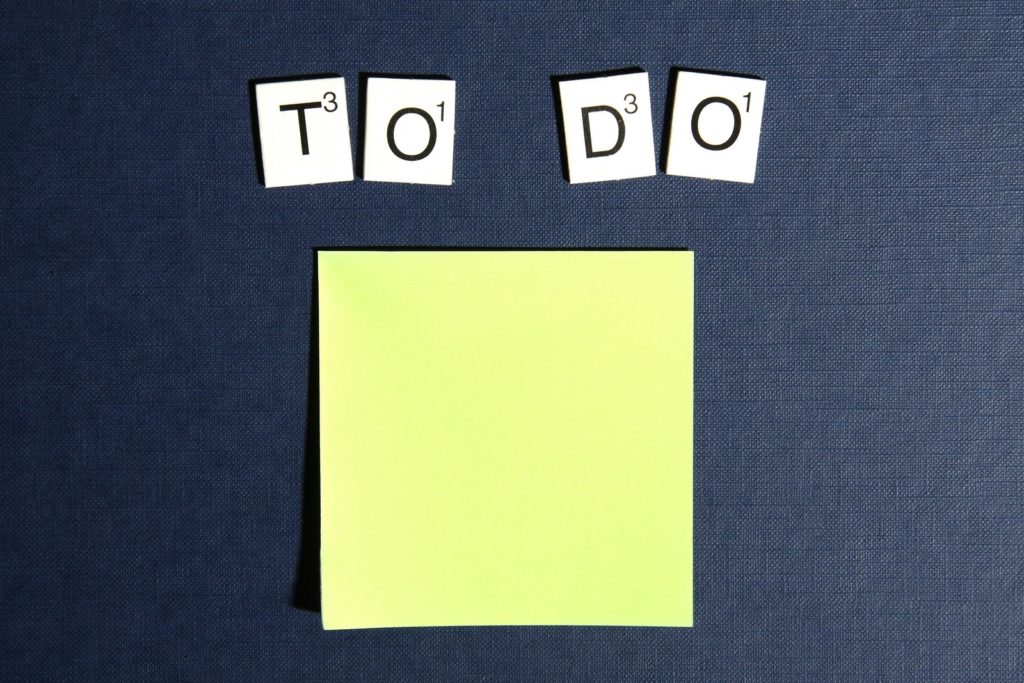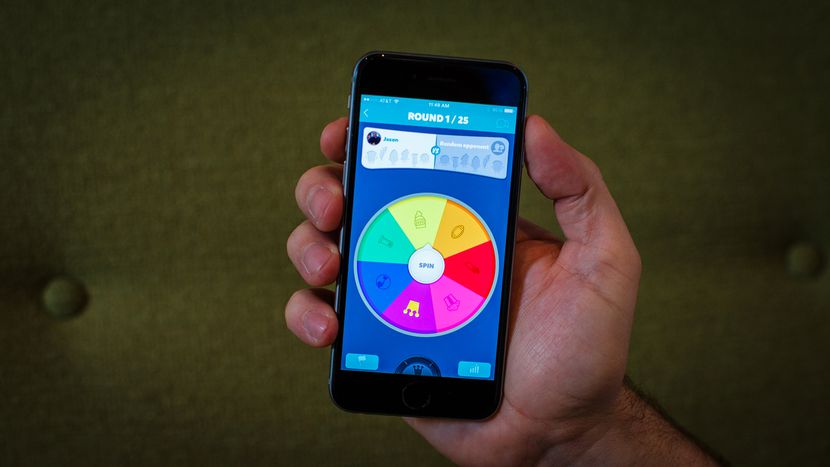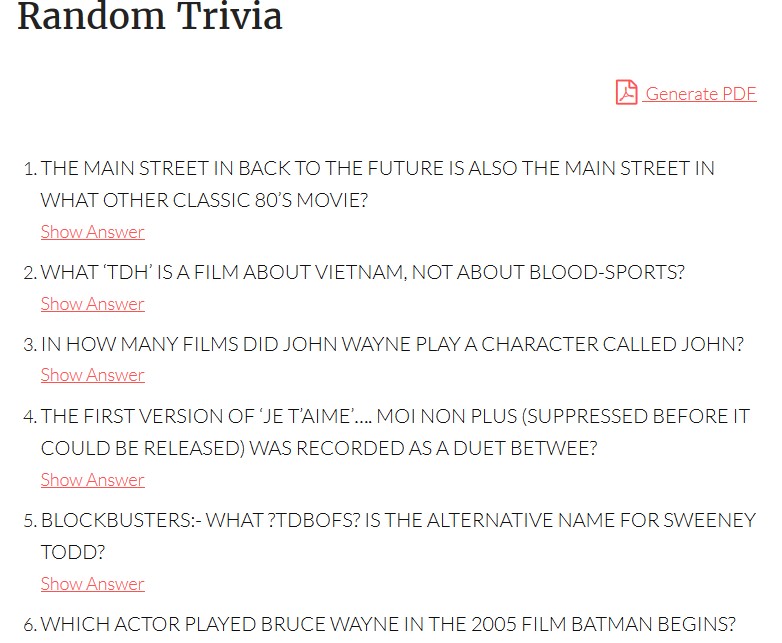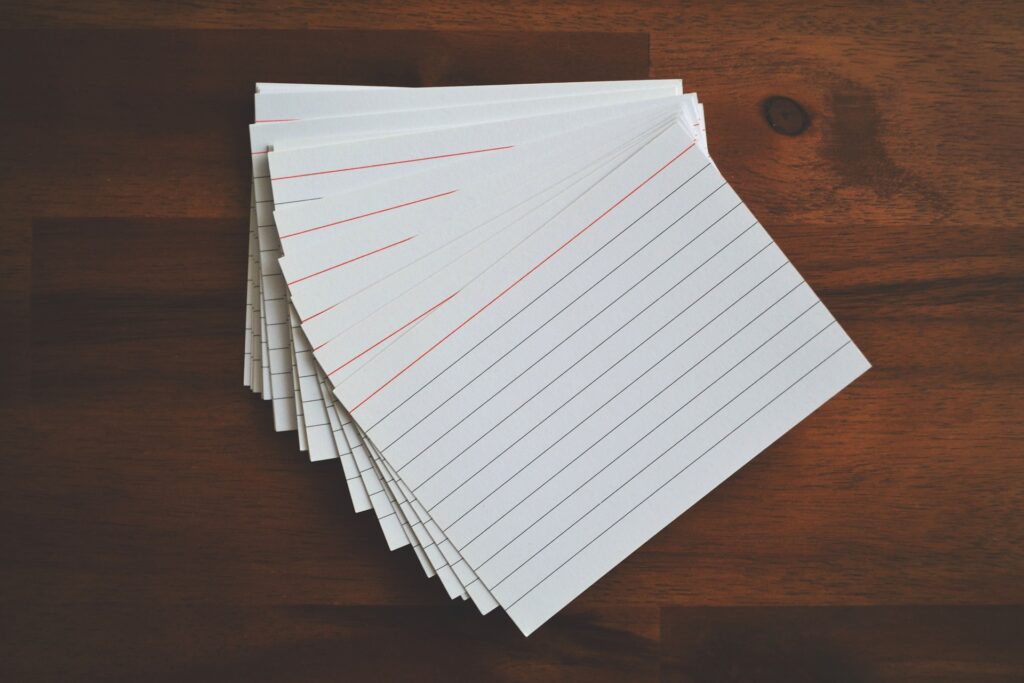
There is nothing worse than going to a bar trivia night and feeling like the weakest link. This can take the form of answering questions and seeing all your answers dismissed by the more trivia savvy players, or it can mean sitting there with a drink in hand, unable to offer any thoughts on answers because of a lack of trivia knowledge. This makes for a night that is somewhere between disheartening and embarrassing, depending on how easily a person gets their feelings hurt.
Luckily, it is possible for anyone to get better at trivia. Sure, catching up to someone with 20 years’ worth of useless knowledge will never be easy, but anyone willing to spend a little time and energy will quickly move up the rank into a contributing member of the team. There is nothing like the look on the face of “Mr. Know-It-All” when your answer—one that you are confident in enough to argue—is the correct one, not the one he convinced himself was correct.
Here is our guide on how to get great at trivia without having to dedicate your entire life to doing so.
Getting Good at Trivia: The Steps
The Initial Phase
Breaking this down into three overall phases—and then focusing on what you need to do in each to become a trivia savant—is the best way to get started. This initial phase will look at some decisions that you need to make and the groundwork that you need to do before you can start your trivia preparedness program.

1. What Do You Know?
Getting started on increasing your trivia knowledge can be a daunting task. There is literally no end to the trivia that can be asked at an event—be it a bar trivia night or at a board game night—so the first thing you have to do is accept that there is no way to know everything about everything.
You do, however, already have a knowledge base that will serve you well here. It might not feel like it—especially if you have only been exposed to themed trivia around pop culture and elements of geek culture you know nothing about—there is knowledge already in your head that you can cultivate and expand upon.
This knowledge will have come from your life experiences—things like your job, your parents’ music tastes, your favorite activity. They are all elements of trivia that you can link to increase your knowledge base.
2. What Do You Like?
It is always easiest to learn about things you like. You have likely had this drilled into you in your high school days, where the subject someone is the best at is the one they enjoy most and will thus put more effort into. Trivia is the same way.
If you are a fan of a certain TV show—say Game of Thrones—then put more effort into learning about the lore of the Seven Kingdoms. If you are a music lover, then delve into your favorite artists and spread from there, learning about their biggest hits and keeping facts and figures within that sphere.
Learning trivia doesn’t just have to be staring at a wall of facts or committing the Periodic Table to memory, and the best way to learn is to focus on things you like.
3. What Do You Want to Know?
Moving on from what you like, another question that needs some thought is: what do you want to know? You might base this on your own wants in terms of trivia or—if you have a partner that is into trivia or you are going to be part of a dedicated team to go to events—then learn things in areas that others in your group are weak in.
One of the best ways to soak in trivia knowledge is simply by staying in touch with the world around us. There will be more on this in the preparation phase, but identifying what you want to know about early on will make your journey to trivia domination much easier.
4. What is Your Mindset?
Think about what type of contributor you are looking to be. Decide how much time—be it hours in a day or a few hours in a week—that you are going to spend honing your trivia craft. While learning about trivia doesn’t have to be boring, it does—like anything—require time and effort to increase your knowledge base.
No one can just pick up a basketball and shoot a high percentage from the free-throw line. Treat trivia the same way. Know that if you aren’t someone who has a tremendous level of focus, then you should build in brain breaks to stop the information going in one ear and out of the other. It will amaze you at how quickly you pick up information if you just decide you are going to care to do so.
5. What is Your Best Way to Learn?
If you aren’t a fan of geography, then trying to learn the capitals of the world is going to feel like a worthless chore. What you might like, however, is vacations, and vacations often happen in different countries. Vacation planning thus becomes a fun way to learn, while also giving the added bonus of eventually leading to a trip to a new place.
You can apply this theory to any trivia category. If you want to brush up on your alcohol knowledge, then invite some friends over for a cocktail night and try a variety of drinks—memorizing the ingredients and having facts about the origins of the beverages on flashcards next to them. Everything is an opportunity to learn new trivia if you look at it in the right way and make the learning experience a fun one.
The Preparation Phase
This second phase is looking more at the specifics of how to prepare for a trivia event. After you have worked out what you know, what you want to know, how you learn, and your trivia mentality, then you can almost view this as the training phase where you put those new thoughts and ideas into practice. Think of this as how to study for trivia, with the benefit that in our modern world there are far more fun ways to do so than by reading a dictionary.

1. Study Tools
Studying is going to be part of the trivia journey you are taking. Thankfully, there are many ways to study in our modern world to get better at trivia. Here is a look at a few of the most popular methods out there:
A – Books and Audiobooks
The oldest and most obvious resource out there, books are always going to be a great source of trivia when you are brushing up on your knowledge. These could be trivia books—books that just dispense fact after the fact often in sorted lists or some other easy-to-digest format—or this could simply mean reading a novel or a play and taking on the information at more than just the usual surface level.
Books are especially useful if you are preparing for a themed trivia night—especially as franchises like Harry Potter and Lord of the Rings are often the subject of such events. Also, if you are an auditory learner, look for audiobooks to supplement what you are reading. And while you’re getting your trivia via audio, check out some trivia-related podcasts, too!
B – Apps
Taking your trivia pursuit to the next level—and to a digital level—will lead you to hunt down trivia apps on your phone or tablet. There are dozens of apps out there that can help you with trivia, from apps that are just endless sources of information for you to study up on through to trivia games that you can play either on your own or with friends/strangers.

HQ Trivia is the dominant app in this space—save for a short shutdown at the beginning of 2020—while the colorful Trivia Crack 2 is another major player in the space. The great part about playing games like this solo is that you can learn at your own pace and without the fear of looking silly in front of others while still getting used to the aspect of competition. That combination makes trivia apps a win/win.
C – The Internet
The problem with relying solely on the internet as a learning resource is that not everything that makes it onto the web is accurate. You could write books—perhaps trivia books—over the amount of false information online, but finding trustworthy websites (and checking the information in a couple of places for accuracy as you investigate) will reduce your margin for error with this method.
Perhaps the best part of trivia discovery on the internet is just how vast the scope of knowledge actually is. Wikipedia and YouTube are classic “rabbit hole” websites where one quick search for a fact can lead to hours of link clicking. Suddenly you have gone from discovering the name of the sixth US President (John Quincy Adams) to discovering the GDP of Togo with no idea how the clicks sent you there. Just be wary of information overload here.

D – TV Shows
The heyday of the TV game show may have come and gone, but there are still quiz shows out there that will increase your trivia knowledge while you chill on the couch. Jeopardy! is the perfect resource here—even (sadly) without the legendary Alex Trebek—as the categories and questions on the show are difficult but within the realm of possibility of something that would be asked at a bar trivia night. Just be aware if the show is a rerun and the questions are a little out of date, as that would be an annoying way to miss an important question.
E – Board Games
Trivial Pursuit is the classic example, but there are even more board games based around trivia and facts than there are TV shows. Even better, they can be found anywhere—especially around the holidays—as every single store now seems to have a board game display near their checkout lanes. It is ideal if you have someone to play the games with, but just reading through the cards and answers is an option too in a pinch. Look for a board game that isn’t too specific—unless the trivia you are going to attend matches the theme—and mix learning with fun in this way.
We have oodles of trivia board game reviews on Trivia Bliss, so that would be a great starting point.
2. Study Techniques
So you have the resources you need to learn. The next step is to decide how you are going to use them. Here are a few ideas to spark a study technique that sounds helpful to your particular style of learning:
A – Read/Retain
The most obvious way to learn is simply to read and retain. This is what we have all been doing all our lives in learning because it is a tried-and-true method. Some people are blessed in that all they have to do is read a fact a few times and they commit it to memory. Others—like myself—struggle with that initial retention.
I have always found it much easier to learn by writing things down, so when I am studying for a trivia night, I will do the same thing. That way I can take my source material and use a full page of paper to organize my thoughts and put the information into areas that make sense together. Upscale this with a friend or partner by adding a whiteboard for learning and entertainment at the same time.
Believe it or not, you can actually improve your memory with conscious effort and training! A great example of how to do this was detailed in the book Moonwalking with Einstein where a journalist went from complete novelist to winning the US Memory Championship. Reading this book will get you quite inspired.
- electrifying work of journalism
- Foer, Joshua (Author)
- English (Publication Language)
- 307 Pages - 02/28/2012 (Publication Date) - Penguin Books (Publisher)
B – Flashcards

Flashcards are an outstanding way to learn. They take all the information that you need and condense it down to key points while removing all the fluff. You can use them either on your own or with friends as you learn and are a great way to keep things at your own pace while adding more items into the equation.
Want to learn all the US states, for example? Well, write all 50 down on flashcards and start with ten, making sure all are easy to rattle off of your tongue. Keep adding in batches of ten until all the states are just a quick thought away.
There are also flashcard apps if you prefer digital learning to physical.
C – Apps and Games
Speaking of apps, apps and games work both as a study tool and a study technique. The question-and-answer sets can basically act like flashcards if you are studying on your own. The bonus is that the facts and stats you will learn are ones that have a shot at making it into a trivia night as they won’t be too obscure.
Using these tools is also a good way to study topics that you wouldn’t really know where to start with—such as the arts for example—which can be huge rabbit holes of information that is valuable, but obscure if you don’t know what you are looking for.
D – Organizing Data
Learning is harder if you don’t know the best way for you personally to organize data. Those of us that can’t just write and retain information often need a mental way to organize facts. Using the example of US States again, there are a couple of ways to do this.
Rather than a haphazard list, either commit the states to memory alphabetically or geographically (west to east is my method). For other facts, you can use mind maps or even tie the trivia—especially if its pop-culture related—to a life event. I will never forget, for example, that The Police released Synchronicity in 1983 as it is the year I was born.
E – Outside Help
Outside help can be as simple as having a friend or loved one work with you to learn facts. Perhaps you have a long car journey ahead and as you drive, they can ask you questions from a set of Trivial Pursuit cards. At a deeper level, look for someone who is good at trivia and pick their brain.
This could be someone from your potential trivia team, or maybe even contacting a local trivia company that you find on Facebook to see if the company manager—usually a trivia expert—would be interested in a consultancy gig. They always say that it isn’t what you know but who you know, and in this situation who you know could be an excellent way of making what you know much more valuable at the bar!
3. Rewards
There is going to come a point—no matter how fun you try to make it—that studying trivia feels a little more like work than you are comfortable with. At that point—and it will happen—you need to incentivize yourself to keep going.
This can be something as simple as allowing yourself a piece of candy after correctly remembering the answers to a dozen flashcards or something more substantial like going out for dinner—on your quiz partner’s tab of course—for recalling the answers to many more tricky questions. Set the rewards in a structure so you always know what you are playing for and get as creative as you want with how you want this to be.
The Action Phase
Ok. So you worked out what you wanted to learn. You then used several tried-and-true study techniques—rewarding yourself handsomely along the way—and you are ready to tackle a trivia night with your friends. Here are a few tips on how to go about that and make the most of your experience.

1. Trivia Type and Venue
It is easy to get overwhelmed on the first trivia night where you are actively expecting to do well and show what you have learned. One way to mitigate some anxiety is to know a little about the trivia game you are playing and the venue where you are competing.
The first check is to make sure that it isn’t a theme night—be it Friends or ’70s music—that you know nothing about. These are hyper-specific and aimed for die-hard fans, so steer clear for now.
The next check is the way they run the trivia. Are you expected to answer one question per round on a whiteboard checked by the host, or is there an answer booklet for 70 questions over the course of the night? Do you have a whole song to give your answer or are they rapid-fire questions every 30 seconds? A little research on the website of the host company will usually give you this information pretty quickly.
As for the venue, is it a bar or is it an event venue with a dedicated entry fee? Is there food served at the venue? If there is food, it’s always recommended buying on site as it supports the business—and remember that no one does well at anything when they are too hungry to concentrate. You cannot be too prepared for knowing about the trivia type and the venue.
2. Level of Competition/Trivia
An aspect that sometimes gets overlooked when thinking about the action phase is the level of competition and the level of trivia you will be playing. Different nights and different venues will attract different crowds. Playing at a martini bar on a Wednesday night will differ from playing at a board game cafe on a Thursday, with the latter having an audience that is geekier and niche and thus better at certain trivia topics.
In my current city, the toughest night is on a Monday at a bar right off of the campus of the main university. This has teams of professors among the players, and their combined knowledge is a force to be reckoned with.

3. Build a Team
The last phase of taking over trivia in your town is to put together a team worthy of your new knowledge. This is another “know your audience” kind of situation.
If you want to go to a bar trivia night and spend more time drinking than playing seriously, then build a team geared to that. If, however, you want to win, then come up with a balanced group of people with knowledge in all areas.
No matter how much you have learned, there will always be someone more into the nuances of certain topics. Don’t lose a trivia night because you forgot to ask the ESPN lifer who wouldn’t even have to switch on his brain to answer the golf question that stumped the rest of the squad.
The biggest factor in all of this is to have fun. The preparing, the learning, and the playing, it is all pointless if you aren’t having fun with it. This isn’t Who Wants to Be a Millionaire? It is you and your friends building memories together and enjoying the company on a night out with a little challenge thrown into the mix. Don’t overthink the process, but dedicate yourself to becoming known as the trivia buff that everyone will eventually want as part of their team.

Leave a Reply